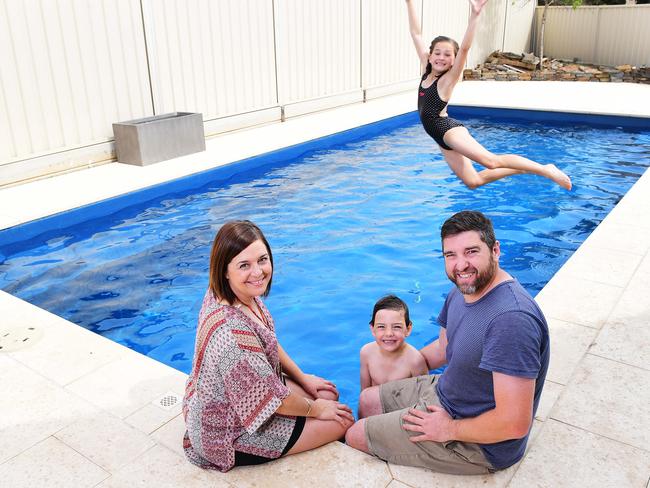Proposed planning reforms to fast-track projects if councils take too long to decide
NEW homes would be automatically approved if councils take too long to make a decision, under potential planning reforms which would also fast-track projects like swimming pools and garages. DATA - SEE YOUR COUNCIL’S PLANNING PERFORMANCE
- Your Say SA: Enshrine sunlight rights in planning rules
- LGA fears loss of planning powers for councils
NEW homes would be automatically approved if councils take too long to make a decision, under potential planning reforms which would also fast-track projects like swimming pools and garages.
In a State Government bid to speed up development approvals, frustrated homeowners and developers will be able to serve a notice on councils triggering automatic approval of their plans if planners fail to meet a legally-binding deadline.
But the proposal, part of a new planning system to begin operating in July 2020, has raised fears that it could lead to expensive legal battles.
The majority of homeowners in one council waited 164 days to receive approval, nearly three times longer than legally required, official data shows.
Under the proposed new planning regime, councils will be considered to have granted “deemed planning consent” if they do not make a decision on straightforward proposals within a specific period, which the planning department said is yet to be decided.
Councils would then have 10 days to issue its own consent which would supersede the automatic approval.
But if a council thinks the application should have been refused it can apply for a court order to quash a deemed planning consent.
State Planning Commission chairman Michael Lennon said the proposed reforms would make planning easier and more simple.
“We want clearer pathways in which the assessment process can be understood,” said Mr Lennon, who has had a 25-year international career in housing, planning and urban design.
The proposal is part of a suite of changes the government says will cut red-tape, streamline planning processes and provide consistency across councils, including:
DEVELOPMENTS such as swimming pools, sheds, garages and carport would be subjected to less rigorous assessment;
PLANNING applications lodged and tracked on an online portal;
PUBLICLY accessible online data comparing the speed at which councils take to approve similar developments;
DELEGATING more planning approval power to the private sector to ease pressure on councils;
FEWER public notification and no appeal rights for less complex developments, such as a common house.
*See end of story for notes about this data.
*Best viewed on a destkop computer. If you’re viewing this story on mobile, go here.
But for more complex and potentially controversial projects a sign will be placed at the site of the proposed development, which will include details of the plans such as images of the building.
Anyone who views the sign would have the right to lodge a submission in favour or against the proposal.
Salisbury Council is the fastest for approvals, taking just three days to approve a similar project, according to most recent processing time data that is lodged with the Planning Department.
Burnside Council general manager Martin Cooper said that compared to other metropolitan councils Burnside has a higher proportion of applications that don’t comply with development plans or require neighbours to be notified.
“Because we have a higher proportion of complex applications and an active community that are well informed and well resourced, we frequently see applications put on hold for several months, sometimes even years, while the parties work towards a resolution,” he said.
“We have always been extremely accommodating when it comes to providing applications with additional time to address problems with their applications.”

Salisbury Council approved 1415 applications last financial year of which city development general manager Terry Sutcliffe said about 70 per cent were so-called category 1, meaning public notification was not necessary, and were more “straight forward”.
“We pride ourselves on (performance) and push ourselves as an organisation to ensure we process applications as quickly as possible,” he said.
The Planning Institute of Australia (SA Branch) said some developments might be rejected to avoid a deemed planning consent “where insufficient information has been provided and the prescribed time frame is about to expire”.
“There is some concern that this may create rushed or poor outcomes that may be damaging to the community and perceptions of the planning system,” it said in a submission lodged this month with the State Planning Commission.
“There are also concerns that this process could, at least in the initial year of its operation, result in an increased number of applications in the courts (and the other appeal authorities) which may slow down the overall development assessment system.”
The Local Government Association of SA said the proposal was a “significant change” and could create an “adversarial assessment environment”.
“Consequences of deemed consent could include more refused applications, more legal action, a reliance on the use of conditions to try to achieve better development outcomes, and ultimately, poor development outcomes that negatively impact the community,” it said in a submission to the reforms.
Grange resident Matt Nicholas, 40, said company Rainwise Pools handled the planning application for his new swimming pool, which took five weeks to install after his order.
He supported greater private sector involvement in approving developments, such as swimming pools, to increase efficiencies and allow councils to deal with more complex applications.
“Councils can still perform the final check if the pool builder says everything is OK,” he said.
*Onkaparinga Council — figures are a median for entire 17/18 financial year
SCHEDULE 1A — minor development such as carports, verandas and sheds, large water tanks, pools, solar panels, demolition
CATEGORY 1 — most common applications, generally for new homes and generally decided by planning officers.
CATEGORY 2 — development requiring notification to immediate neighbours to a proposal. No third-party appeal rights to a decision. Proposals generally heard by a council assessment panel.
CATEGORY 3 — potentially more controversial proposals and subject to wider public notification. Third party appeal rights.
